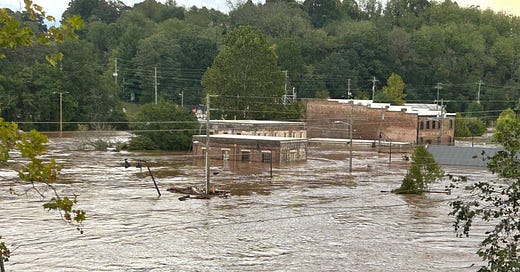I evacuated my home in Asheville, North Carolina at 4 AM on Sunday morning.
We had lost power, cell service, and internet on Friday around 8:30 AM due to heavy winds and flooding from Hurricane Helene. On Saturday, we lost running water.
Before deciding to leave, we had driven an hour and a half through heavy traffic to find the nearest open grocery store in Asheville. When we arrived, we found that there was no water left on the shelves, they were only taking cash, and the line to check out was nearly two hours long. On the way back home we discovered all of the ATMs were out of service, and the gas stations had no fuel.
I’ve experienced a few different types of crisis — from California wildfires to COVID lockdowns. This was a unique episode largely because there was no way to easily communicate. Either with friends within the city, or family and general information sources in the outside world. It was terrifying not being able to assess how much danger we were actually in, or to let loved ones know I was alive.
So early Sunday morning, with about 110 miles worth of gas in our car and rumors that if we headed south towards Charlotte we’d be able to refill, we left the city. Thankfully we did find gas and make it to Chapel Hill. We are among the lucky ones, safe and sound with friends who have graciously made their home available.
The experience has been a visceral and embodied reminder of the fact that sometimes, systems fail. Complex social systems with fragile and antiquated infrastructure are especially prone to failure in societies that don’t value competence.
I started this newsletter in part because I’m cynical about our prospects for averting widespread systemic breakdown and institutional failure, yet fundamentally optimistic about the future. I believe in the capacity for human creativity, compassion, and wisdom to facilitate rapid recovery, real improvements and boundless innovation.
As a result of my experience, I feel a clear need to spend less time sharing my research and theorizing, and more time discussing my efforts in applied systems science.
More on what this looks like soon.
PS: If you’d like to support relief efforts in Asheville, here’s a website our friend group has set up, and a gofundme set up by another friend of mine.





Emergencies are relatively easy to respond to. People who take action get support. Itʻs the rebuild that is the challenge. People have to work to eat so they move. Others buy up what they leave. Community and history disappears. People stay and fight for community. But then what can you rebuild? Itʻs so expensive! Who will insure it?
Also difficult is systemic collapse that is more gradual--When the economy no longer works for people, when housing, food, health care, childcare/eldercare is too expensive and/or scarce, when the systems that got us here no longer support us. Maybe emergencies happen again and again and nothing works any more. Maybe the empireʻs lifespan is over. Maybe the tower of Babel falls again. Then you either move to other empires or you stay where you are and pioneer new systems in the rubble. This is not a time for "business as usual." Iʻm old and established in the current system but Iʻm excited about possibilities, about the power of systems thinking/science to help us create new kinds of social systems and understand more deeply those that lasted for centuries in the past. Entropy may mean dispersal, but it also means more possibility for new combinations. Crazy, but exciting times!